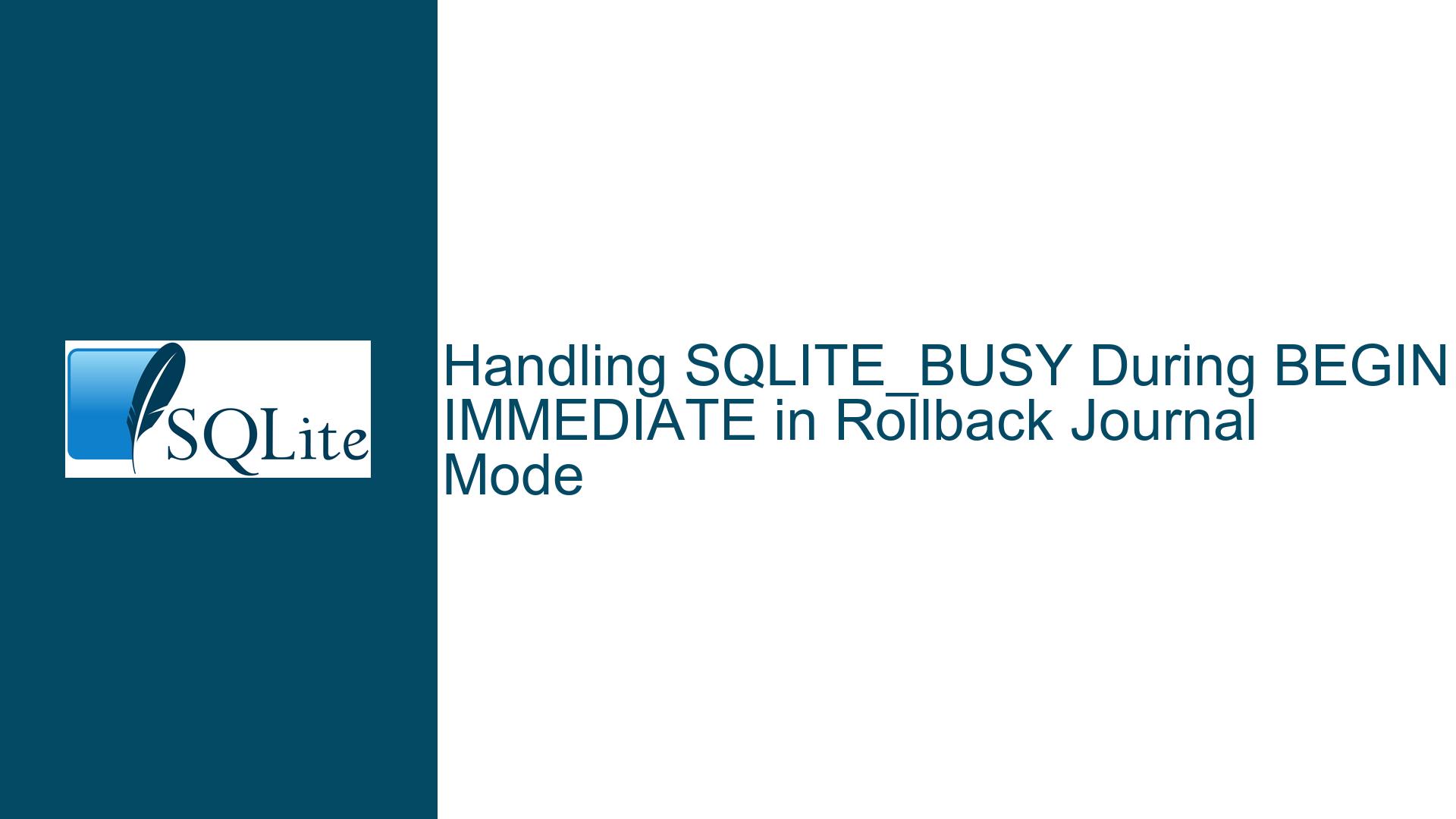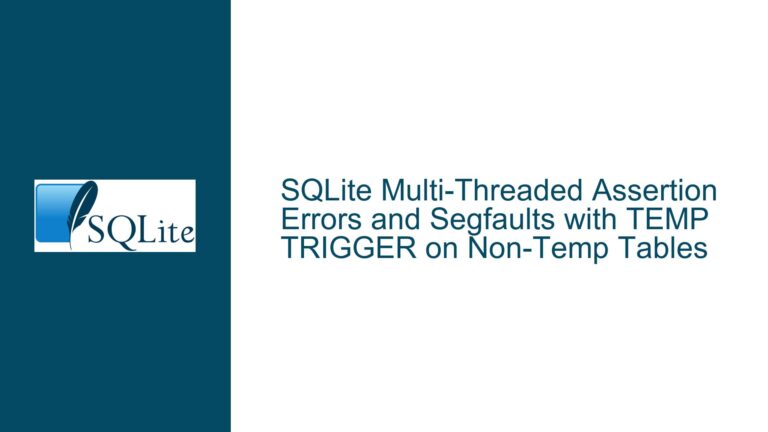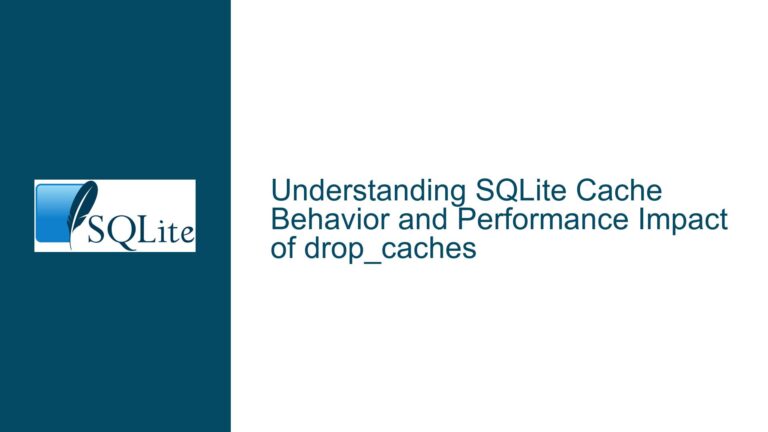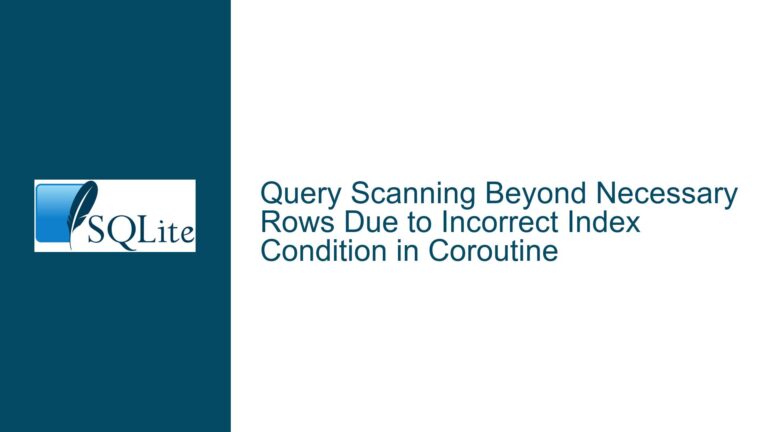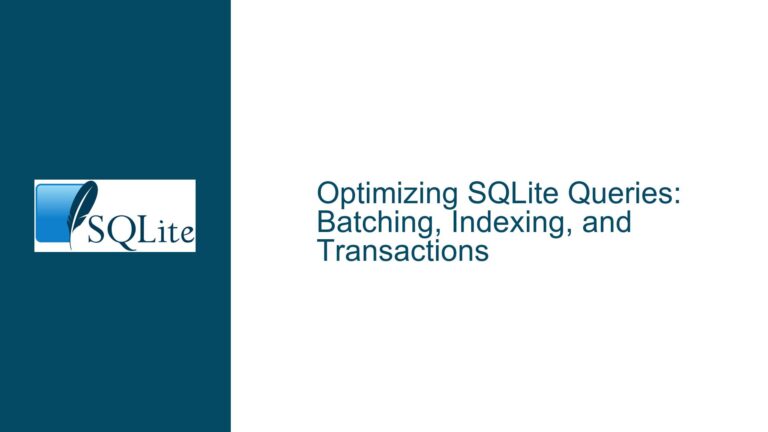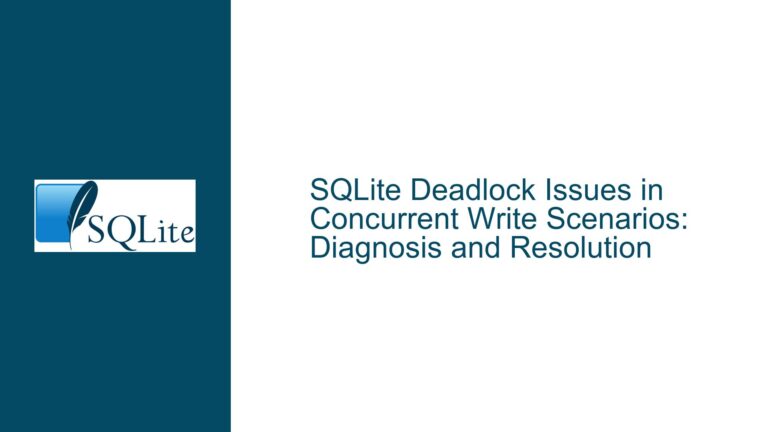Handling SQLITE_BUSY During BEGIN IMMEDIATE in Rollback Journal Mode
Understanding SQLITE_BUSY and Busy Handlers During Lock Acquisition
The SQLITE_BUSY error occurs when a database connection cannot acquire a required lock due to contention with other connections. This error is particularly common in scenarios involving concurrent read/write operations. SQLite’s busy handler mechanism allows applications to define custom logic (e.g., retry delays) to handle such contention gracefully. However, in rollback journal mode, a critical edge case arises when attempting to upgrade a transaction from a read (SHARED lock) to a write (RESERVED/EXCLUSIVE lock) using BEGIN IMMEDIATE.
Lock Acquisition in Rollback Journal Mode
In rollback journal mode, transactions follow a strict lock hierarchy:
- NONE: No locks held.
- SHARED: Allows concurrent reads.
- RESERVED: Permits writes but not commits.
- EXCLUSIVE: Required for committing changes.
A BEGIN IMMEDIATE transaction starts by acquiring a SHARED lock, then attempts to escalate it to RESERVED. If another connection holds a RESERVED or EXCLUSIVE lock, SQLITE_BUSY is returned. Unlike write-ahead logging (WAL) mode, where BEGIN IMMEDIATE acquires a WRITE lock directly, rollback journal mode’s incremental lock escalation introduces contention points during the SHARED→RESERVED transition.
The Role of Busy Handlers
The busy handler is a callback function registered via sqlite3_busy_handler() or PRAGMA busy_timeout. It dictates how long a connection should wait before retrying a failed lock acquisition. However, SQLite’s internal logic may bypass the busy handler in scenarios deemed deadlock-prone. For example, if a connection holds a SHARED lock and attempts to escalate to RESERVED while another connection holds RESERVED, SQLite may return SQLITE_BUSY immediately instead of invoking the busy handler. This behavior is intentional to prevent indefinite waiting but complicates retry logic for BEGIN IMMEDIATE in rollback mode.
The Contradiction in Advisory Guidelines
The common advice to avoid upgrading read transactions to writes (by starting with BEGIN IMMEDIATE) assumes that the busy handler will manage contention during lock escalation. However, in rollback mode, the initial SHARED lock acquisition for BEGIN IMMEDIATE can fail to trigger the busy handler when escalating to RESERVED. This leaves applications to handle SQLITE_BUSY manually, which undermines the purpose of PRAGMA busy_timeout and complicates abstraction layers (e.g., ORMs or database wrappers).
Why BEGIN IMMEDIATE Fails to Invoke Busy Handlers in Rollback Mode
Deadlock Avoidance Mechanisms
SQLite’s lock manager prioritizes deadlock prevention over retry flexibility. When a connection attempts to escalate from SHARED to RESERVED, SQLite checks for potential deadlocks. If another connection holds RESERVED and is waiting for EXCLUSIVE (to commit), allowing the first connection to wait indefinitely via the busy handler would block the second connection indefinitely. To break this impasse, SQLite returns SQLITE_BUSY immediately, bypassing the busy handler.
Internal Lock Escalation Logic
The function sqlite3InvokeBusyHandler (internal to SQLite) determines whether to call the busy handler during lock acquisition. However, this function is not exposed via the public API. In rollback mode, the escalation from SHARED to RESERVED is handled by the pager layer (pager_wait_on_lock), which skips the busy handler if the lock is unavailable. This design ensures that SHARED locks are released promptly, allowing other connections to progress.
Misalignment Between WAL and Rollback Journal Modes
In WAL mode, BEGIN IMMEDIATE acquires a WRITE lock directly, bypassing the SHARED→RESERVED escalation. This eliminates the contention point where the busy handler is bypassed. Applications using WAL mode rarely encounter this issue, leading to confusion when migrating to rollback journal mode.
Busy Handler Registration via PRAGMA
PRAGMA busy_timeout sets a default busy handler that sleeps for incremental intervals. However, this handler is only invoked during lock acquisitions that SQLite deems safe to retry. For SHARED→RESERVED escalation in rollback mode, the handler is skipped, rendering busy_timeout ineffective for BEGIN IMMEDIATE transactions.
Resolving Busy Handler Issues in Rollback Journal Transactions
Step 1: Validate Busy Handler Configuration
Ensure the busy handler is registered correctly:
- Explicit Registration: Use
sqlite3_busy_handler()to define a custom handler that logs retry attempts. - PRAGMA busy_timeout: Verify the timeout is set (e.g.,
PRAGMA busy_timeout=5000;) and persists across connections.
Step 2: Implement Application-Level Retry Loops
Since SQLite may bypass the busy handler during SHARED→RESERVED escalation, wrap BEGIN IMMEDIATE in a retry loop:
int retries = 0;
while (retries < MAX_RETRIES) {
rc = sqlite3_exec(db, "BEGIN IMMEDIATE;", NULL, NULL, NULL);
if (rc != SQLITE_BUSY) break;
usleep(calculate_backoff(retries));
retries++;
}
Adjust calculate_backoff() to align with your busy_timeout settings.
Step 3: Monitor Lock State with SQLITE_FCNTL_LOCKSTATE
Use sqlite3_file_control() with SQLITE_FCNTL_LOCKSTATE to inspect the current lock state. This helps differentiate between transient contention and permanent deadlocks.
Step 4: Custom VFS Locking Implementations
If using a custom VFS, ensure the xLock and xUnlock methods correctly report contention. Misreporting lock status can cause SQLite to bypass the busy handler erroneously.
Step 5: Leverage SQLITE_CONFIG_LOG for Debugging
Enable SQLite’s internal logging via sqlite3_config(SQLITE_CONFIG_LOG, ...) to trace lock acquisition attempts and busy handler invocations.
Step 6: Consider Forcing SHARED Lock Release
After a failed BEGIN IMMEDIATE, execute ROLLBACK to release the SHARED lock immediately, allowing other connections to proceed. Retry BEGIN IMMEDIATE after a delay.
Step 7: Evaluate Migration to WAL Mode
If feasible, switch to WAL mode to avoid SHARED→RESERVED contention. WAL’s concurrency model allows readers and writers to coexist without blocking, making BEGIN IMMEDIATE more reliable.
Step 8: Patch SQLite with Custom Busy Handler Invocation
For advanced use cases, modify SQLite’s source to invoke the busy handler during SHARED→RESERVED escalation. Locate the btreeInvokeBusyHandler function in btree.c and ensure it is called in the pager’s lock escalation path.
Final Solution: Hybrid Transaction Management
Combine BEGIN IMMEDIATE with application-level retries and careful busy handler configuration. Use WAL mode where possible, and fall back to rollback mode with the above mitigations when necessary.
This guide systematically addresses the interplay between SQLite’s lock escalation logic, busy handler limitations, and transaction management strategies. By understanding the nuances of rollback journal mode and adopting defensive retry mechanisms, developers can mitigate SQLITE_BUSY errors while maintaining concurrency and performance.
